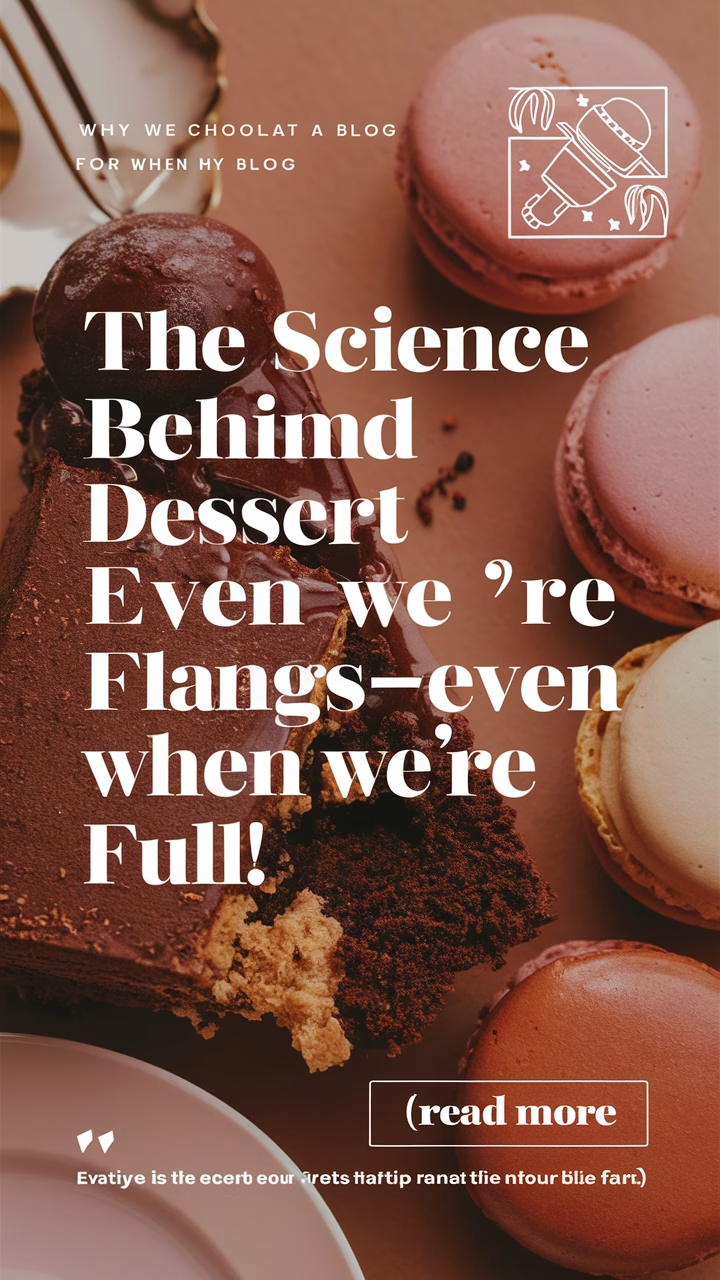Why We Crave Dessert Even When We’re Full, Explained by Science
Ever find yourself completely stuffed after a meal, yet somehow magically making room for dessert? You’re not alone! It’s a universal experience, and recently, scientists at the Max Planck Institute for Metabolism Research have shed some light on the fascinating reasons behind our seemingly insatiable sweet tooth. Their groundbreaking study delves into the neural mechanisms that drive our dessert cravings, even when our stomachs are telling us otherwise. This might just be the secret to finally understanding—and perhaps managing—our sugar consumption.
Unlocking the Sweet Mystery: The Role of POMC Neurons
So, what exactly is going on in our brains when we reach for that extra slice of cake? The key players in this scenario are **POMC neurons**, a group of cells in the brain known for their role in regulating appetite and energy balance. What the researchers discovered is that these neurons have a surprising dual function.
**Signaling Fullness:** Initially, POMC neurons kick into gear after a meal, sending signals that we’re full and should stop eating.
* **Triggering Sugar Cravings:** At the same time – and here’s the kicker – these very same neurons also trigger cravings specifically for sugar.
It’s like they have a secret agenda! This happens because, in addition to signaling satiety, POMC neurons release natural opioids like **beta-endorphins** when exposed to sugar. These opioids activate reward pathways in the brain, making us feel good and reinforcing the desire for more sugary treats.
To uncover this intricate mechanism, the researchers employed advanced techniques like **optogenetics** (using light to control brain cells) and **brain imaging**. This allowed them to precisely observe and manipulate the activity of POMC neurons and map their effects on sugar consumption. What they found was a direct link between the activation of these neurons and an increased drive to consume sweets.
An Evolutionary Sweet Tooth: Why Our Brains are Hardwired for Sugar
This seemingly contradictory behavior – feeling full but still wanting dessert – might seem like a design flaw, but it actually makes perfect sense from an evolutionary perspective. Think back to our ancestors, who didn’t have access to a constant supply of food. For them, **sugar was a rare and valuable source of quick energy.**
**Quick Energy Boost**: Sugary foods provided a rapid spike in blood glucose, giving our ancestors the energy they needed to hunt, gather, and survive.
**Survival Mechanism**: This is why our brains evolved to strongly crave and reward the consumption of sugar. It was a matter of survival!
The study also highlighted a crucial point: This neural circuit appears to be **highly specific to sugar**. It doesn’t affect our cravings for other types of food, such as fats or proteins. This specificity suggests that the craving for sweets is a deeply ingrained, hardwired response that has been shaped by our evolutionary history. Looking for shirts to show off your foodie love? Check out our selection of foodie-related shirts & churro-themed apparel at Creme Filled Churros Shop, and let everyone know you love the sweeter things in life!
Beyond Willpower: Implications for Managing Sugar Consumption
So, what does all this mean for those of us trying to manage our sugar intake? The findings from this study have some significant implications:
**Understanding the Root Cause**: It shows that our dessert cravings aren’t simply a matter of willpower or lack of self-control. They’re driven by complex neural mechanisms that are deeply rooted in our biology.
**Potential Obesity Treatments**: By understanding how POMC neurons contribute to sugar cravings, researchers can potentially develop new strategies for managing sugar consumption and treating obesity.
One exciting possibility is the development of drugs or therapies that could selectively block the activity of this neural circuit. Imagine being able to curb those overwhelming sugar cravings without affecting your overall appetite or energy levels!
However, it’s important to note that this research is still in its early stages. The study was conducted in mice, and **further research is needed to confirm the effectiveness of blocking this neural circuit in humans**. But the initial findings are promising and offer a new perspective on the challenges of managing sugar consumption.
The Future of Sweet Treats: Re-Thinking Our Relationship with Sugar
The Max Planck Institute’s study provides a fascinating glimpse into the science behind our dessert cravings. It reveals that our brains are wired to crave sugar, thanks to a clever evolutionary trick that once helped our ancestors survive. While this mechanism may no longer be necessary in our modern, food-abundant world, it continues to influence our eating habits and contribute to the global obesity epidemic.
Here are some things to keep in mind:
**Awareness**: Being aware of these underlying neural mechanisms can help us approach our sugar cravings with more understanding and less self-blame.
**Mindful Eating**: Instead of simply trying to resist our cravings, we can focus on mindful eating practices that help us savor and appreciate our food, without overindulging.
**Seeking Support**: For those struggling with sugar addiction or obesity, seeking professional help from a therapist or registered dietitian can provide valuable support and guidance.
This new understanding might just pave the way for more effective strategies for healthier eating habits. What amazing local dessert shops do you visit? Share a listing to support them in our business directory: Submit to our business directory.
Ultimately, the goal is not to eliminate sugar from our lives entirely, but to develop a healthier and more balanced relationship with it. By understanding the science behind our sweet tooth, we can make more informed choices and take control of our cravings. And who knows, maybe one day we’ll even have a scientifically proven way to say “no” to that extra slice of cake – without feeling deprived! Have a favorite dessert recipe you would like to share? Submit a dessert recipe to be featured on our site: Share Your Recipe and bring joy to others.

